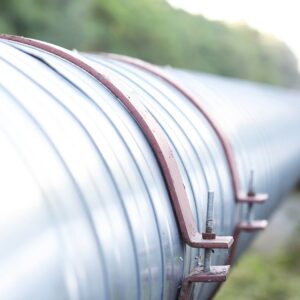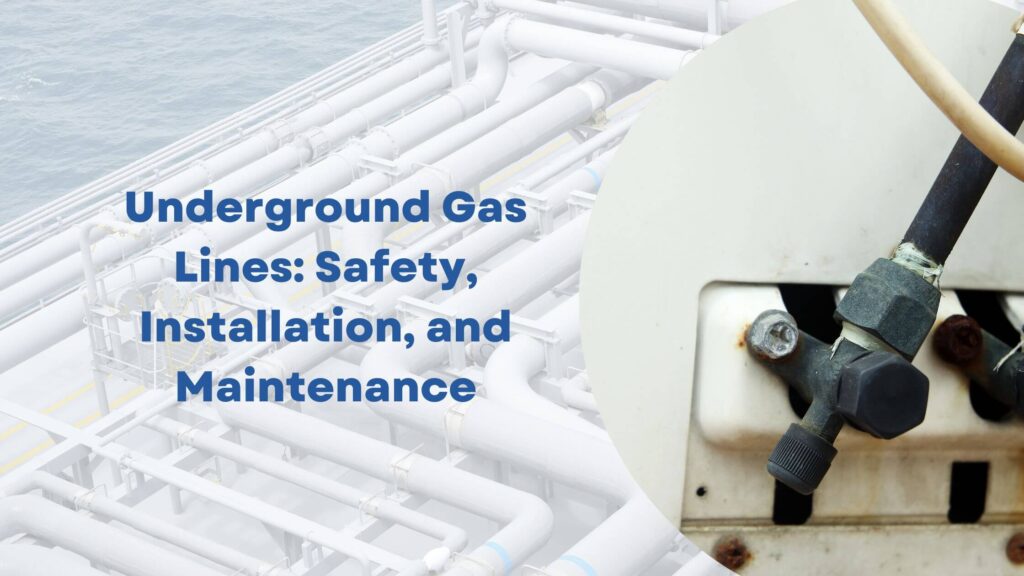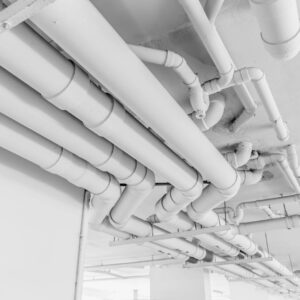Underground gas lines play a crucial role in supplying natural gas to residential, commercial, and industrial properties. Proper installation, maintenance, and safety measures are essential to ensure a reliable and safe gas supply. In this article, we will explore the importance of underground gas lines, their installation process, maintenance requirements, and safety protocols.

- The Importance of UGL: Underground gas lines are the lifelines that deliver natural gas to our homes, businesses, and industries. They facilitate the transportation of this clean and efficient energy source, powering various appliances such as stoves, water heaters, and furnaces. The concealed nature of underground gas lines also helps maintain the aesthetics of the surroundings, making them a preferred choice for gas supply networks.
- Installation of UGL: The installation of underground gas lines requires meticulous planning and adherence to safety standards. Before installation, a detailed analysis of the site is conducted to determine the best routes and avoid potential hazards. The installation process involves trenching, laying the gas pipes, jointing, and backfilling. Trained professionals, equipped with the right tools and knowledge, handle this critical phase to ensure the gas lines are properly installed and protected against potential damage.
- Ensuring Safety: Safety is paramount when dealing with underground gas lines. Gas leaks can lead to hazardous situations, including fire and explosions. Regular inspections, leak detection, and pressure tests are conducted to identify and address potential issues promptly. Emergency shut-off valves and safety devices are installed to minimize risks. It’s crucial for homeowners and businesses to be aware of gas safety protocols and promptly report any suspected gas leaks.
- Routine Maintenance: Regular maintenance of underground gas lines is essential for their longevity and optimal performance. Maintenance tasks include inspecting and repairing any damaged or corroded pipes, replacing worn-out components, and clearing debris or vegetation that may pose a threat to the gas lines. Timely maintenance ensures a continuous and reliable gas supply, reducing the risk of service interruptions.
- Understanding Gas Line Markings: Utility companies use color-coded markings on the ground to indicate the presence of underground gas lines. These markings are essential for excavators and contractors to avoid damaging gas lines during construction or digging activities. It is crucial for anyone planning to dig or excavate in the vicinity of gas lines to follow state regulations and contact the local utility company for proper marking and guidance.
The Significance of Underground Gas Lines
UGL are crucial components of natural gas supply systems, delivering a safe and reliable energy source to homes, businesses, and industries. Their concealed nature and minimal visual impact make them an ideal choice for maintaining the aesthetics of the surroundings while powering essential appliances.

Mastering the Art of Installing
The installation process of underground gas lines requires meticulous planning, skilled execution, and a strong focus on safety. Qualified professionals use specialized equipment and techniques to ensure secure installation and protection against potential damage.
Safety First: Protecting Communities through Gas Line Safety
Safety is paramount when dealing with gas lines. Regular inspections, leak detection procedures, and pressure tests are essential to identify and address potential issues promptly. Emergency shut-off valves and safety devices further mitigate risks.
Maintaining Optimal Performance: Prolonging Gas Line Lifespan
Regular maintenance is crucial for the longevity and optimal performance of underground gas lines. Timely inspections, repairs, and clearing of debris help minimize gas supply interruptions and ensure a continuous and reliable energy source.
Safe Digging: UGL Markings
Gas utility companies use color-coded markings to indicate the presence of underground gas lines. Understanding these markings is vital for avoiding accidental damage during construction or digging activities and preserving the integrity of the gas supply network.

FAQs (Frequently Asked Questions)
What are underground gas lines, and what is their purpose?
Underground gas lines are pipelines installed beneath the ground to transport natural gas from its source to residential, commercial, and industrial properties. Their primary purpose is to provide a safe and efficient means of delivering natural gas to power various appliances, such as stoves, water heaters, and furnaces.
How are underground gas lines installed?
The installation process involves meticulous planning and adherence to safety standards. Before installation, a detailed site analysis is conducted to determine the best routes and avoid potential hazards. Trained professionals use specialized equipment to trench, lay gas pipes, perform secure jointing, and backfill the trenches. The emphasis on safety during installation ensures the protection of the gas lines against potential damage.
What safety measures are in place to prevent gas leaks?
Safety is paramount when dealing with underground gas lines. Regular inspections, leak detection procedures, and pressure tests are conducted to identify and address potential issues promptly. Emergency shut-off valves and safety devices are installed strategically to mitigate risks. It’s essential for homeowners and businesses to be aware of gas safety protocols and promptly report any suspected gas leaks.
How often should underground gas lines be maintained?
Regular maintenance is crucial for the longevity and optimal performance of underground gas lines. Routine inspections should be conducted, and any damaged or corroded pipes should be repaired or replaced promptly. Clearing debris and vegetation that may pose a threat to the gas lines is also part of regular maintenance.
Are there precautions when digging near underground gas lines?
Yes, it’s essential to take precautions when digging near underground gas lines. Gas utility companies use color-coded markings on the ground to indicate the presence of gas lines. Before digging, it’s crucial to contact the local utility company to get proper markings and guidance to avoid accidentally damaging the gas lines.
What should I do if I suspect a gas leak?
If you suspect a gas leak, it’s essential to act quickly and follow these steps:
a. Leave the area immediately and evacuate everyone from the vicinity.
b. Do not use any electronic devices or light switches, as they could trigger a spark.
c. From a safe distance, call the gas utility company and emergency services to report the leak.
d. Avoid re-entering the area until it has been declared safe by professionals.
Can I install or repair underground gas lines myself?
No, installing or repairing underground gas lines should only be performed by qualified professionals who have the necessary training and expertise. DIY attempts can be extremely dangerous and may lead to gas leaks or other hazards. Always rely on licensed gas technicians for any gas line-related work.
How deep are underground gas lines typically buried?
The depth at which underground gas lines are buried can vary depending on local regulations and environmental factors. Generally, gas lines are buried at least 18 inches to 24 inches deep in residential areas and deeper in commercial and industrial zones.
Are there any warning signs of a gas leak I should be aware of?
Yes, some common warning signs of a gas leak include:
- The smell of sulfur or rotten eggs.
- Hissing or whistling sounds near gas appliances or pipelines.
- Dead or discolored vegetation in the vicinity of gas lines.
- Bubbles in standing water close to gas pipes.
If you notice any of these signs, take immediate action and report the situation to the gas utility company.
Gas leaks can pose a significant threat to the safety of your home and community. Detecting and addressing gas leaks promptly is essential to prevent potential hazards. If you’re residing in Tampa, you can rely on our expert gas leak services to ensure the safety of your property and loved ones. In this blog, we will highlight the importance of addressing gas leaks, the potential risks involved, and how our specialized gas leak services can offer you peace of mind.
The Importance of Addressing Gas Leaks:
Gas leaks can have severe consequences, including fire, explosions, and health hazards. The natural gas used in homes and businesses is odorless, but gas companies add a distinct odor (similar to rotten eggs) to help identify leaks. If you notice this smell or suspect a gas leak due to other signs such as hissing sounds or dead vegetation near gas lines, it’s crucial to act immediately. Ignoring a gas leak can lead to catastrophic consequences, endangering lives and property.
Potential Risks of Gas Leaks:
Gas leaks can cause both immediate and long-term risks. In the short term, they can result in fire and explosions, causing severe damage to your property and nearby structures. Additionally, exposure to natural gas can lead to health issues, including headaches, dizziness, nausea, and respiratory problems. Over time, even small gas leaks can lead to a gradual deterioration of air quality, potentially affecting your family’s health.
How Our Gas Leak Services Can Help?
a. Expert Detection: Our skilled technicians utilize advanced equipment to detect gas leaks accurately. We conduct thorough inspections of your property, including gas lines, connections, and appliances, to identify any potential issues.
b. Prompt Response: Gas leaks demand immediate attention. We prioritize emergency calls and offer 24/7 availability to address urgent situations promptly.
c. Safe Repairs: Our team is trained to handle gas leak repairs safely and efficiently. We take all necessary precautions and follow industry guidelines to ensure the safety of your property during repairs.
d. Preventive Measures: Beyond repairing existing gas leaks, we also provide preventive maintenance services. Regular check-ups and maintenance help detect and address potential issues before they escalate into major problems.
Why Choose Our Local Gas Leak Services:
a. Local Knowledge: As a local service provider, we have an in-depth understanding of the gas infrastructure and regulations in Tampa, Florida. Our familiarity with the community enables us to offer tailored solutions for your specific needs.
b. Licensed Professionals: Our team consists of licensed and experienced gas technicians who are well-versed in handling gas leak emergencies with expertise and precision.
c. Quick Turnaround: We value your safety and strive to offer quick turnaround times for inspections, repairs, and maintenance.
d. Customer Satisfaction: Our commitment to customer satisfaction is unwavering. We ensure transparent communication, fair pricing, and quality service to earn your trust and confidence.
Conclusion: Gas lines are vital for delivering natural gas to our homes, businesses, and industries. Proper installation, regular maintenance, and strict adherence to safety guidelines are imperative to ensure the continuous and safe supply of this valuable energy source. By understanding the importance of underground gas lines and the protocols surrounding them, we can help create a safer environment for everyone.



Pingback: Bayshore Boulevard Tampa Florida - Gas Leak Repair Tampa
Pingback: Raymond James Stadium Tampa Florida - Gas Leak Repair Tampa
Pingback: Tampa Riverwalk Tampa Florida: Explore the Heartbeat of the City - Gas Leak Repair Tampa